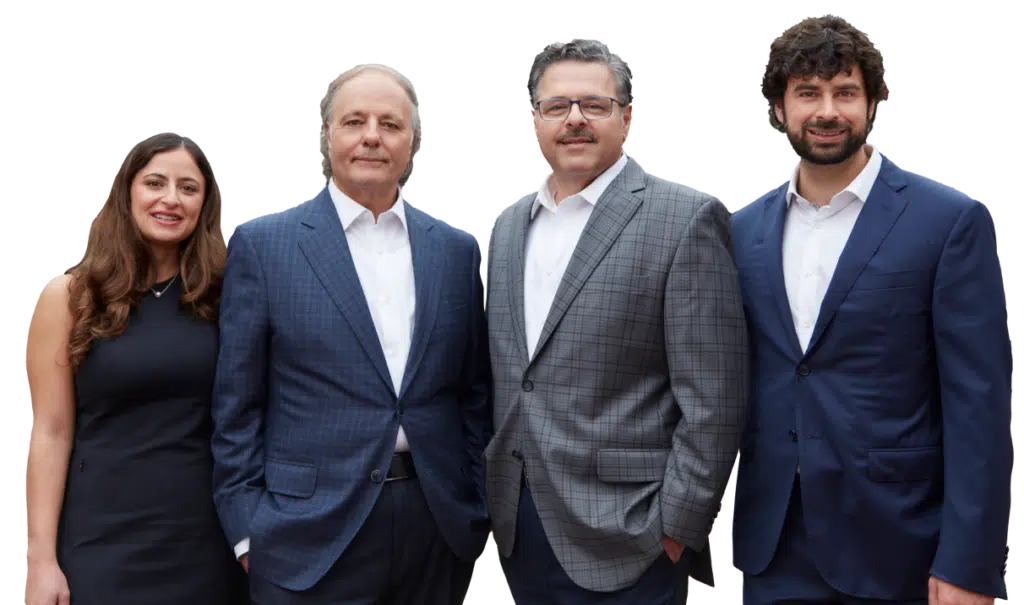Workers’ Compensation Lawyers in Ocala, Florida
Workers’ compensation is an insurance program that provides medical care and lost wages to workers who suffer work-related injuries and illnesses. The claims process is supposed to be straightforward, but some employers and insurers refuse to cooperate. If your employer fights your claim, call an experienced Ocala workers’ compensation lawyer from Farah & Farah at (352) 205-4023.
Home » Ocala Personal Injury Lawyers » Workers’ Compensation Lawyers in Ocala, FL
If you are injured on the job, and your employer or their insurer doesn’t pay the benefits you’re entitled to, you may end up with high medical expenses and other bills piling up due to time out of work. Employers and insurance companies that try to avoid paying owed workers’ comp will have vast experience in doing so and will use every trick they can against you.
At Farah & Farah, we’ve been fighting against tactics designed to reduce benefits for injured workers since 1979. Our Ocala workers’ compensation lawyers will fight just as hard for you.
Why You’ll Want the Workers' Comp Lawyers From Farah & Farah on Your Team
When you hire Farah & Farah, you get an entire team of nationally recognized personal injury attorneys in Ocala who will combine their talents and resources to win you the benefits you deserve.
We have protected injured workers from greedy corporations for over 40 years and learned that experience makes all the difference. We know what it takes to get successful results for our clients, and nothing is more rewarding to us than receiving client feedback such as the following:
"Excellent service throughout my entire process, excellent customer service, always prompt with replies and tact in their approach. Would recommend to anyone who needs efficient and effective legal representation!"
— Mikhail D.
We’re committed to handling every workers’ compensation case with compassion, honesty, and hard work. If your employer refuses to pay you the benefits you deserve, we can help.
How Our Workers’ Compensation Attorneys in Ocala Can Help
We’ll take over all aspects of your case, so you won’t have to do a thing except complete your treatment. You can count on our award-winning Ocala workers’ compensation lawyers to do the following:
- Thoroughly investigate the cause and circumstances of your accident.
- Review your medical records and keep track of your progress.
- Keep you informed of the status of your case and promptly return your calls.
- Communicate with your employer and the insurance company on your behalf.
- Identify additional sources of compensation, including third-party lawsuits and additional benefits.
free case review
Can I Sue My Employer for Workers’ Compensation?
You can’t sue an employer covered by workers’ compensation insurance, but you can sue third parties, such as insurance companies, defective product manufacturers, negligent contractors, and property owners.
We are committed to getting you as much compensation as the law allows. We’ll look closely at any parties other than your employer who contributed to your injuries.
Why Should I Sue a Third-Party Organization?
A lawsuit against a third party will enable you to recover additional compensation, including pain and suffering, additional lost wages, and punitive damages in some cases.
What Workers’ Comp Benefits Do I Qualify for?
We will also look for additional benefit programs, such as short-term or long-term disability insurance you may have obtained through your employer. If your work injury is expected to result in a disability lasting for a year or more, our Ocala Social Security Disability lawyers can help you apply for disability along with your workers’ compensation.
How Much Does Workers’ Comp Pay in Florida?
Workers’ compensation pays for the cost of treatment for your work-related injury and a weekly payment of up to 66.67 percent of your average pre-injury weekly earnings. The exact amount you receive depends on whether you are totally or partially disabled and whether your disabilities are permanent or temporary.
Permanent Total Disability Benefits
If your disability prevents you from performing any type of work, including sedentary work, you may qualify for permanent total disability payments, which are 66.67 percent of your average weekly wage. You can collect these as long as your benefits do not exceed 100 percent of the state average weekly wage.
You can receive permanent total disability until you reach the age of 75. If you do not qualify for social security because your injury prevented you from earning enough work credits, you can continue to receive permanent total disability from workers’ compensation.
Temporary Total Disability Benefits
Temporary total disability is payable in the amount of 66.67 percent of your pre-injury weekly wage for a maximum of 104 weeks, up to 100 percent of the state average weekly wage. This is available when your doctor says you cannot work due to your workplace injury.
These benefits may be converted to permanent total disability benefits in the following scenarios:
- You reach your maximum medical improvement before the 104 weeks expire and still cannot perform any type of work.
- You are still receiving benefits 104 weeks after they began.
If your injuries are catastrophic, you can receive an enhanced benefit of up to 80 percent of your average weekly wage for six months. Your injuries are considered catastrophic if they result in quadriplegia, paraplegia, blindness, or amputation. The state average weekly wage does not limit these enhanced benefits.
Permanent Impairment Benefits
Permanent impairment is the legal term for permanent partial disability, and benefits are available to people who can perform some work but not the same work they were doing before. Your earning capacity is generally lower. Benefits of 75 percent of your average weekly are paid every other week, and your benefit amount can be reduced if you earn wages.
These benefits are paid for varying lengths of time based on your disability rating. The disability rating measures how much your disability affects you. The higher your disability rating, the longer you can receive benefits. Benefits can last for as little as two weeks or as long as 600 weeks, as shown below:
| Your Disability Rating | Duration of Your Benefits |
|---|---|
| 1–10% | 2 weeks per percentage point |
| 11–15% | 3 weeks per percentage point |
| 16–20% | 4 weeks per percentage point |
| 21% or higher | 6 weeks per percentage point |
Temporary Partial Disability Benefits
The benefits paid will be 80 percent of the difference between 80 percent of your average weekly wage before and after injury, as long as it doesn’t exceed 66.67 percent of your average weekly wage before your accident.
If you are disabled but capable of performing some type of work, even sedentary work, your disability is considered partial. If you are expected to fully recover and return to your pre-injury earning capacity, your disability is considered temporary.
Medical Care Expenses
The insurance company is supposed to pay your healthcare provider for medically necessary treatment for your work-related injuries no matter how your disability is classified. You may be reimbursed for expenses you must pay upfront, such as travel costs to and from appointments and treatments.
Examples of medical expenses covered by workers’ comp include:
- Remedial treatment
- Attendant care
- Medications
- Medical supplies
- Durable medical equipment
- Orthotics and prosthetics
- Work-hardening programs
- Pain management
- Limited chiropractic treatments
A Workers’ Comp Claim Denial Is Not Final
If your workers’ compensation claim is denied, you don’t have to accept it. You have the right to file an appeal, and our experienced, talented team of workers’ compensation attorneys in Ocala can help you get the initial results overturned.
The appeals process begins with a Petition of Benefits form filed by you or your attorney with the Office of the Judge of Compensation Claims. The judge will likely order you to go through mediation, an outside-of-court dispute resolution process. If you settle during mediation, the parties execute a written agreement resolving the case.
If an agreement is not reached, the case will proceed to a pretrial hearing, followed by a final hearing. The judge will issue a decision and a compensation order after the hearing. If the judge rules against you, you can appeal to the First District of the District Court of Appeals.
Do I Need a Lawyer for a Workers’ Compensation Case in Florida?
While it’s not required to have a workers’ compensation lawyer representing you, having this kind of expertise on your side can be incredibly beneficial. At Farah & Farah, our workers’ compensation lawyers in Ocala can handle every step of your claim for you. You benefit from knowing all of your documents are filed correctly, on time, and with the benefit of our over 40 years of experience.
Why Would a Workers’ Comp Claim Get Denied?
In a perfect world, you would notify your employer of your injury, the employer would report the injury to their insurer, and you would promptly start receiving your benefits. In a case like this, you wouldn’t need an attorney.
Unfortunately, this isn’t always how it plays out. Workers’ compensation claims have multiple moving parts, and the potential is high for something to go wrong, such as:
- The insurance company may deny coverage.
- The insurance company may downplay your injuries.
- Your employer may falsely accuse you of being intoxicated.
- Your employer may blame you for the accident.
- Your employer may have neglected to obtain the required coverage.
- Your employer may falsely claim that you are not an employee.
- Your employer may fail to report your injuries to the insurance company.
- You may receive an inappropriate diagnosis or disability rating.
- Your employer may threaten to fire you for filing a claim.
- The insurer may label your permanent disability as temporary.
- You may be marked as partially disabled when you are totally disabled.
These actions are attempts to limit your compensation. Our Ocala workers’ compensation lawyers have successfully refuted them all. If we file your initial claim, these companies are less likely to take advantage of you while you are injured.
When Should I Call a Workers’ Compensation Attorney?
If you have already applied and your employer has failed to cooperate, it’s never too late to call us at (352) 205-4023. Our legal team will pick up the case wherever you left off.
We’ll deal with the insurance company and employer and manage all the details so your case can receive the full amount of benefits you’re entitled to. Working with a lawyer from the beginning gives you a better chance of having your claim approved the first time.
How Long Do You Have To Sue for Workers’ Comp in Florida?
If your workers’ compensation claim is denied or you receive a lowball offer, you have up to two years to file a petition of benefits. This deadline is known as the statute of limitations. If you do not file your petition on time, you can lose your right to receive benefits.
It is crucial to contact an experienced Ocala workers’ comp attorney as soon as possible after you receive a negative decision to ensure your attorney has ample time to investigate and prepare your case well before the statute of limitations expires.
Workers’ Compensation Frequently Asked Questions
Our answers below address the frequently asked questions we receive. Contact us if you have other questions about your claim. You will get through this, and our attorneys will be here for you.
Can I See My Regular Doctor After Getting Hurt at Work in Florida?
You are generally limited to a selection of doctors provided by your employer. However, you can use your own pharmacist if your pharmacy participates in workers’ compensation.
If you are dissatisfied with your doctor, the state does allow you to change doctors, but only once.
Are My Workers’ Comp Benefits Taxable?
Workers’ compensation benefits are not taxable, per Section 104 of the federal Internal Revenue Code.
How Much Do Workers’ Compensation Lawyers Charge in Florida?
An attorney must obtain a judge’s approval for any fees charged and these fees cannot exceed the state maximum, which is a small percentage of your award. Our Ocala workers’ compensation lawyers at Farah & Farah charge nothing unless you win.
Can My Family Receive My Workers’ Compensation Benefits if I Die From a Work Injury?
In the tragic event of your death from an occupational injury, your family can receive funeral expenses of up to $7,500 and 66.67 percent of the worker’s average weekly wage, up to $150,000 in wage replacement, to be divided among your qualified dependents.
Let Team Farah Go To Work for You
If you have been hurt in a workplace accident, call an experienced Ocala workers’ compensation lawyer from Farah & Farah at (352) 205-4023 or contact us online for your free case review. Whether you are submitting your initial claim or appealing a denial, we’ll handle everything so you can focus on your recovery.

Why You’ll Want the Workers’ Comp Lawyers From Farah & Farah on Your Team
How Our Workers’ Compensation Attorneys in Ocala Can Help
Can I Sue My Employer for Workers’ Compensation?
How Much Does Workers’ Comp Pay in Florida?
A Workers’ Comp Claim Denial Is Not Final
Do I Need a Lawyer for a Workers’ Compensation Case in Florida?
How Long Do You Have To Sue for Workers’ Comp in Florida?
free case review
Client Testimonials


YOU AND YOUR FAMILY










